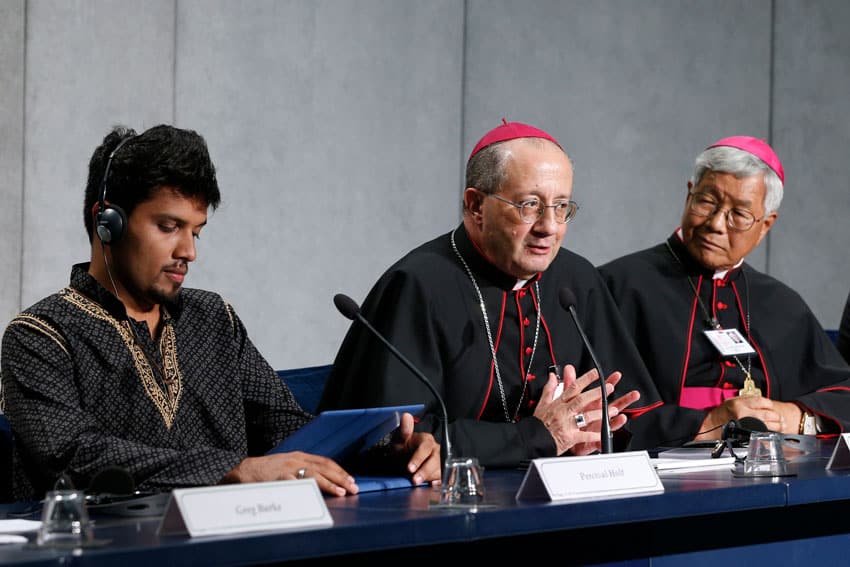
We began as usual with the Divine Office chanted in Latin. Cardinal Ribat of Port Moresby was in the chair.
The Relator-General (our discussion facilitator) summed up the conclusions of Part II. He noted that at Cardinal Baldisseri’s behest the small groups had focused more on substantive theological matters than on modifying the wording of the Instrumentum Laboris. He then introduced Part III. In this part of the Synod, we must discuss how the Church may grow nearer to her young members, be more welcoming, gain their trust and esteem, and how best evangelise them, form them and care for them pastorally.
A youth auditor then compared youth with fire that needs kindling, can burn bright or dwindle, can power great projects or spread chaotically and destructively. He described the challenges to youth in India and beyond. He feared that many pastors are uncomfortable with young people and fail to teach them with clarity. He proposed national meetings of bishops to address the issues of the Synod, and national youth councils. Like Zaccheus, some young people have shameful pasts or confused or curious present situations, but when they encounter Christ, they have great futures!
One Synod Father spoke of the many issues for young Maronites in the persecutions and migrations of the Middle East and dispersed around the globe.
Another spoke of the role young people can play as civil influencers and leaders according to Catholic social teaching and at the service of the common good. They have the intelligence, idealism and hope to do this.
In what seemed to me the best presentation before morning tea, one bishop spoke of the inadequate catechesis of 1970s and 80s (when he was growing up) and how it had left many Catholics uninformed about their faith. He said that however important the affective elements of accompaniment and discernment with young people, we must also address their intellectual concerns. We must answer four questions which are the corners that frame the jigsaw of faith: Who is God? Why, if there is a God, is there evil? What has God done about it? How can I get on board with God doing in something about it? Once this frame in put in place, people can bring and fit their own pieces, as well as identify pieces that do not fit the puzzle.
In what seemed to me the best speech after morning tea, a Synod Father pointed out that many young people are looking to the Church for clarity about her moral teaching on matters such as sexuality; others want the Church to change her teaching more in line with the world; and others again are confused about what the Church actually teaches, perhaps because older people have been ambiguous or unhelpful. When the rich young man approached Jesus, the Lord did not water down the law of God but actually asked more of the young man! We must encourage youthful idealism rather than undermining it.
Other Synod Fathers made various points:
- “A Church leadership too asleep to dream is not worthy of our God or young people”
- We must leave our spiritual comfort zones; establish diocesan youth councils and parish structures for including youth; and plan for greater efforts in youth ministry
- Young people can help usher in a new heaven and a new earth
- Shining Christian witnesses make credible the faith they enact; shining young Christians are the most effective witnesses of all
- Youth themselves should be principal protagonists in the transmission of faith to their peers in the post-Constantinian era
- Young people want Church music that brings them together, that inspires awe and prayer, that is professional not slovenly or mere novelty, that respects our liturgical musical canon but also experiments not with the faith but with its expressions, that evangelises and persuades by “the nostalgia of the heavens”
- Future priests need better formation as they come from a youth culture that does not always prepare them well for this vocation; formators therefore need to be identified and formed themselves
- Many young people in cultures like the Philippines are drawn closer to God and the Church through popular devotions
- World youth days and international volunteering are powerful points of conversion for young people
+Anthony Fisher op
For all updates on the Synod on Youth click here.
